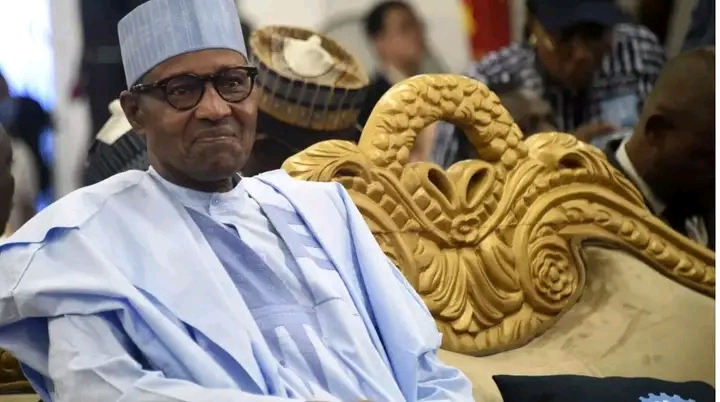In a heart-wrenching update, former Nigerian President Muhammadu Buhari has passed away at the age of 82 in a London clinic. Reports indicate that he traveled to the UK in April for a routine medical check-up, but later fell ill.
Buhari, a former military ruler who transitioned into a self-styled democrat, returned to power through elections but faced significant challenges in convincing Nigerians that he could deliver the change he promised. Not known for being a natural politician, he was often perceived as aloof and austere. Nonetheless, he maintained a reputation for personal honesty, a rare trait among Nigerian politicians.
After three unsuccessful attempts, Buhari made history in 2015 by becoming the first opposition candidate to defeat an incumbent president. He was re-elected in 2019 for another four-year term. His support base primarily consisted of the impoverished northern population, known as “talakawa” in Hausa, and he benefited from a united opposition during his 2015 campaign.
Many believed Buhari’s military background and discipline were the keys to addressing the Islamist insurgency in the north. He also vowed to combat corruption and nepotism in government and create job opportunities for Nigeria’s youth. However, his presidency coincided with a decline in global oil prices and Nigeria’s most significant economic crisis in decades.
His administration faced criticism over its handling of security issues. While campaigning, Buhari promised to defeat the Islamist militant group Boko Haram, which continues to pose a threat, with one of its factions now allied with the Islamic State. Additionally, there was a rise in violent clashes between farmers and ethnic Fulani herders in central Nigeria. As a Fulani himself, Buhari faced accusations of not being sufficiently tough on the herders or addressing the crisis adequately.
Under his leadership, armed forces were accused of human rights violations, notably during a deadly incident involving anti-police brutality protesters in Lagos in October 2020.
A Glimpse into Muhammadu Buhari’s Life
Born in December 1942 in Daura, Katsina state, Muhammadu Buhari grew up in a Nigeria still under British colonial rule, with independence achieved 18 years later. After losing his father at the age of four, he was raised by his Kanuri mother. In a 2012 interview, Buhari reflected on being his father’s 23rd child and his mother’s 13th, sharing a vivid memory of being thrown from a horse with his father and half-brother.
Buhari’s education began in primary school in Daura and continued at a boarding school in Katsina. He later joined the Nigerian Military Training College, enlisting in the army shortly after Nigeria gained independence. His officer training took place in the UK from 1962 to 1963, setting the stage for his eventual rise through the military ranks.
Reflecting on his upbringing, Buhari attributed his strict demeanor to the discipline instilled during his boarding school years and military training. He felt fortunate to have experienced such challenging environments that taught him the value of hard work.
In 1966, Nigeria experienced a military coup and a subsequent counter-coup, but Buhari claimed he was too junior to have played a significant role. Less than a decade later, he became the military governor of the north-east and, under a military regime, was appointed federal commissioner for petroleum and natural resources in 1976.
A Controversial Rule and Historic Election
By 1978, Buhari had returned to military command, and his decisive actions in 1983 against Chadian soldiers who annexed Nigerian islands in Lake Chad are still remembered in the north-east. The end of 1983 saw Buhari rise to military ruler following a coup that ousted elected President Shehu Shagari. He ruled for 20 months, a time marked by a campaign against indiscipline and corruption, but also human rights abuses.
Buhari’s reputation for honesty among Nigeria’s politicians stemmed largely from his anti-corruption efforts, which led to the imprisonment of numerous politicians and businessmen. Some viewed these actions as necessary to combat widespread corruption, while others criticized them as heavy-handed repression.
His unique approach to governance included requiring Nigerians to queue at bus stops under the watchful eyes of soldiers, as well as public humiliation for civil servants who arrived late to work. While some of his measures were perceived as eccentric, others, like restrictions on press freedom, were seen as repressive.
After his release from prison, Buhari entered party politics, advocating for multiparty democracy and free elections, despite defending his military coup in 1983. In 2015, he made history by becoming the first opposition candidate to defeat an incumbent since Nigeria returned to democracy in 1999.
As president, Buhari emphasized his “incorruptibility” and declared his modest wealth, claiming to have turned down previous opportunities for personal enrichment. His straightforward demeanor garnered mixed reactions from the media and the public alike.
Yet, as his presidency progressed, many began to question whether the structures enabling corruption had truly been reformed, and his efforts to improve youth employment were still a work in progress.
The Legacy of a Presidency
On the day Buhari left office, a viral video captured Nigerians reflecting on his presidency, with many recalling the skyrocketing price of rice as a defining memory. Under Buhari, the cost of a 50kg bag of rice soared from 7,500 naira ($5) under former President Goodluck Jonathan to a staggering 60,000 naira, leading to widespread hunger.
The price surge was largely attributed to Buhari’s ban on rice imports, aimed at encouraging local farmers. However, local production failed to meet demand, leading to disillusionment among his supporters.
Nigerians affectionately nicknamed Buhari “Baba go slow,” a nod to his slow pace in appointing his cabinet upon taking office in 2015. In response to the moniker, Buhari remarked that the sluggishness was not solely his fault but a reflection of the system.
As Nigeria navigated the complexities of politics in 2022-2023, Buhari’s body language suggested a lack of clear support for his successor, Bola Tinubu, leading to speculation about his true sentiments behind the scenes.
Buhari’s administration also introduced a controversial “naira swap policy,” aimed at limiting the influence of money in the 2023 elections. However, the policy led to cash shortages and suffering for millions, especially those reliant on cash transactions, before being suspended by the Supreme Court just days before the election.
His presidency, marked by significant health challenges that caused him to miss considerable time from work, raises questions about transparency regarding his fitness for office. Despite reinventing himself as a democrat, Buhari’s health remained a closely guarded secret, leaving many Nigerians in the dark about their leader’s well-being.
Muhammadu Buhari was married twice and is survived by his wife, Aisha Halilu, and their 10 children, leaving behind a complex legacy that will be debated for years to come.








